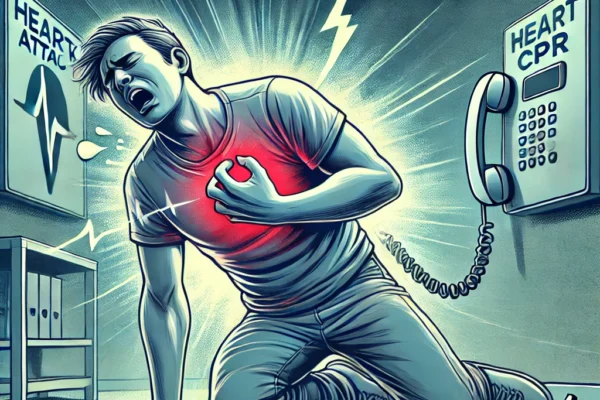In today’s digital age, convenience often drives our decisions. When it comes to CPR and First Aid training, the allure of an online-only certification can seem like a quick and easy solution. However, this convenience can sometimes come at a high cost. Particularly when that certification is not recognized by employers or reputable organizations like the American Heart Association (AHA). In this blog post, we’ll delve into the common pitfalls of CPR and First Aid online certification scams, provide real-world examples, and offer tips on how to avoid falling victim to these scams.
The Appeal of Online-Only Certifications
Picture this: you’re browsing the internet and come across a website offering a CPR certification for the unbeatable price of $14.95. All from the comfort of your home. No in-person training, no hassle. It sounds almost too good to be true—and unfortunately, it often is.
Many online-only certification programs promise a quick and easy path to getting certified. They often fall short of delivering on those promises. In many cases, these certifications are not recognized or accepted by employers. For some employees, holding a valid CPR, BLS, or First Aid certification is a requirement just to clock in for their job. Making a legitimate certification absolutely essential.
The easiest way to distinguish between a reputable online CPR/First Aid training program and a potential scam is to look for specific terms and requirements. Reputable online training programs are typically labeled as “Blended” or “Hybrid,” meaning they require both an online component and an in-person skills session. Unlike scams that promise full certification online, legitimate programs will issue a “completion” certificate for the online portion. Which indicates that the participant has finished the theoretical part of the training. For example, it may say something like “Jane has successfully completed the CPR/AED requirements of Online Completion,” signaling that further in-person skills training is needed to achieve full certification. This in-person component is crucial for validating the participant’s hands-on abilities, which is why it’s a key marker of legitimate training.
Real-World Examples of Online Certification Scams
Imagine paying for an online-only CPR class from a so-called “national” CPR training company, completing the course, and receiving your certification. You might think you’re all set, but when you present your certification to your employer, you find out that it is not recognized. This is a common scenario for those who have been duped by online certification scams.
A nurse recently came to us excited about starting a new job. Unfortunately, she had a frustrating experience with an online certification provider. She had purchased a course that promised a virtual skills session along with a CPR Anywhere manikin and other necessary supplies. After making the payment, she found herself unable to reach anyone from the company. Leaving her without the materials she needed to complete her certification. As a result, she had to purchase the entire course again to meet her job’s requirements.
In one unfortunate case, a employee completed an online CPR course, only to later discover that her employer wouldn’t accept the certification. It lacked an in-person skills assessment. Unable to provide the proper certification within the required timeframe, she ultimately lost her job, highlighting the importance of choosing a legitimate, recognized training program.
Why Reputable Companies Require In-Person Skills Checks
A critical component of any legitimate CPR or First Aid certification is the hands-on skills check. This in-person evaluation ensures that you can perform life-saving techniques correctly under the guidance of a certified instructor. No reputable organization, including the AHA, will issue a certification without this essential step.
While some companies may offer virtual skills check-offs, it’s important to verify the legitimacy of these programs by contacting the organization directly. Make sure they are recognized by reputable bodies like the AHA, HSI, or other well-established entities before enrolling.
How to Protect Yourself from Certification Scams
To avoid falling victim to online certification scams, follow these guidelines:
-
Research the Company: Before enrolling in any online course, research the company thoroughly. Check for reviews, ratings, and any red flags. Ensure the company is recognized by reputable organizations like the AHA or HSI.
-
Verify Certification Requirements: Understand that no legitimate CPR or First Aid certification can be earned entirely online. There must be an in-person skills assessment. If a company offers certification without this, it’s likely a scam.
-
Contact the Company Directly: If you’re unsure about a course, contact the company directly. Ask about their training methods, certification process, and accreditation. A reputable company will have no issue providing you with this information.
-
Be Wary of Low Prices: The old adage, “You get what you pay for,” rings true here. While a low price may be tempting, remember that quality training comes with a cost. If the price seems too good to be true, it probably is.
-
Check Employer Requirements: Before enrolling in any course, check with your employer to ensure the certification will be accepted. Some employers have specific requirements. It’s better to confirm in advance than to waste time and money on an invalid certification.
Conclusion
CPR and First Aid certifications are crucial for many professions. Obtaining them should be taken seriously. While online courses can be convenient. It’s essential to ensure that the certification you receive is legitimate and recognized by your employer. Remember, any reputable CPR certification will require an in-person skills assessment. No amount of convenience is worth the risk of falling for a scam.
If you’re looking for a legitimate certification, consider contacting a trusted AHA provider like Arise Safety & CPR. We offer a variety of training options that meet AHA standards, ensuring that your certification is recognized and respected.
Stay safe. Do your homework. Most importantly, invest in quality training that you can rely on when it matters most.
Contact Us:
Website: AriseSafety.com
Email: contact@arisesafety.com
Phone: 317-961-1480





